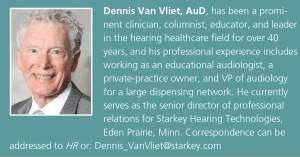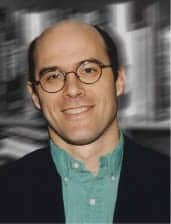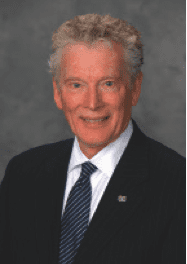Final Word | August 2017 Hearing Review
In this issue of The Hearing Review, my friend David Hawkins, PhD, talks about retirement, and offers those of us not in that position some good advice (see his article on p 14). I like his comments about doing “…more of what you are good at.” I would add, however, that we can always find more things to be good at, and open up the horizon to have an even greater variety of things to do.
One of my roles is teaching clinical skills like taking ear impressions. There are basic safety and procedural practices that must be adhered to, but there are a variety of ways to observe safety and procedural conventions and be good at taking ear impressions. Some variety comes with the tools that we use. There are some of us who prefer the hand syringe approach, and others who like the impression gun. Some of us prefer cotton dams, and some prefer foam. Preferences aside, I encourage students and professionals I am training to embrace all methods and be good at the full spectrum of ear impression techniques with either the syringe or the gun, cotton or foam. There will be a time when there may not be enough supplies to proceed with your favorite method, or your preferred method is awkward or unsafe, and a good clinician will have options to get the job done.
This philosophy holds true for learning to work with different equipment. It’s not unusual in a busy, multi-clinician environment to have more than one generation or manufacturer/model of equipment for the same purpose. We can be much more valuable to the productivity of the team if we are flexible enough to use any piece of equipment, not just our old, comfortable favorite.
Dr Hawkins also recommends that we “hang out with and learn from the colleagues you like and admire.” I couldn’t agree more. As a new audiologist more than 40 years ago, I had much to learn, and appreciated the mentoring I received from my colleagues at work and those I met at meetings. Over time the group of friends expanded to an international network of friends who remain very important to me. It worked out so well that I married one 19 years ago! Together, we can travel on personal as well as professional time and have the opportunity to meet up with friends and colleagues nearly anywhere we find ourselves.
Turning to those who are far from retirement, I have some concerns. We all should be, deserve to be, embracing and enjoying our careers. As I read the professional social media posts written by some clinicians today, I see some of the enthusiasm that many of us have managed to keep as we care for those with hearing difficulty, but I also see frustration; frustration about working conditions, insufficient professional respect, difficult patients and poor compensation from third party payers, or employers. I would encourage those of you who are expressing frustration to look at what you have control over that can be changed to make things better for you. Recall that there are many roles we can fill and still provide the services that we are good at. For example, some of the most rewarding times I have experienced as an audiologist have been with pediatric patients. They can be challenging and at the same time especially rewarding because of the challenges. Seeing these children mature into productive adults over the years yields extra heartwarming bonuses. (Is there an emoji for that?)
The concerns about third party compensation are valid. We can have some control by working to educate patients and payers, and by lobbying for fair payment. As a group, we have demonstrated a lack of enthusiasm for professional associations who provide organized support for us. A fraction of licensed professionals are members of the associations who monitor legislation and advocate solely on our behalf. Instead of feeling frustrated as individuals, we can and should feel empowered as professional groups.
Insufficient professional respect and support is a problem. As a 6-foot-plus male with a loud voice, I entered the profession with unearned respect. I don’t have control of the perception of younger female professionals. I can only offer the advice that my wife, Alison Grimes, AuD, offers to her fourth year students: Address patients and other professionals with warm confidence and authority, and recognize that there may be challenges from opposite-gender individuals. Meet those challenges as you would any equal with even more respectful confidence. Doing so, you will earn the respect you deserve.
The Final Word? Observing “…moderation, perspective, and having fun” is the advice I appreciate the most from David Hawkins. I miss him (a lot) at meetings offering amusing banter mixed with important commentary and analysis of scientific presentations. I also appreciate the foundational research he provided for those of us who are having too much fun to retire and continue working. He may regret trying to accomplish too much, but the rest of us are the beneficiaries of that dedication. Thank you, David Hawkins.






